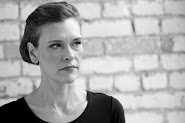Letter to John Berryman
by Ann Bogle
for Christa Maria Forster
Maybe we'll try elevator music again. That would appeal to the senses. As the book begins to close, Normandberger appears as sister speech, endearing term for summer friend. A friend of a deep friend, a serious secular religious poet living near Chicago, Bill Yarrow. Festshrift my favorite writer. Jane Bowles. Feminine wiles. I'll go Scottish on my oath. An escort from Moscow inspired my friend in writing his novel on bedding. Deep set women laboring deep set men. I thought of Stephen Dunn's poetry about divorce in the bookshop in St. Paul.
Maybe we'll try elevator music again. That would appeal to the senses. As the book begins to close, Normandberger appears as sister speech, endearing term for summer friend. A friend of a deep friend, a serious secular religious poet living near Chicago, Bill Yarrow. Festshrift my favorite writer. Jane Bowles. Feminine wiles. I'll go Scottish on my oath. An escort from Moscow inspired my friend in writing his novel on bedding. Deep set women laboring deep set men. I thought of Stephen Dunn's poetry about divorce in the bookshop in St. Paul.
Based on a photo: Evie Shockley is protected, a garden herb, better than hosta. I met her mid-flight in a windowed elevator in Atlanta. I met Dunn in the same elevator at ground level going up. Hilda Raz's son's speech on the panel where Dunn described his date with Liza Minnelli left me disconcerted.
Hilda Raz had lost a daughter. Her son gained a persona, backed by biological components. His male-pattern baldness impressed me. In the elevator Dunn said he'd seen that I had cried at it, the loss to female pride, as I experienced it. Dunn said he had known already about Raz's son.
Leo Kottke and I happened to go to lunch the same day in Excelsior. I ate like a man, soup, as I always do. I tend to be thin yet eat unapologetically. He flickered rue when I said I had bipolar, as if saying so would not go well. It was a publisher who released Janet Frame. As I put it, “Fat chance.” He said he was in a correspondence with Kay Redfield Jamison. Creativity clears sinus, a middle path, a moral resistance to flight and melancholy as savored by artists, so knock on stove for Sylvia Plath, whose nature poems outstrip mirth. We are fluent in English not at the roots.
My doctor, Faruk S. Abuzzahab, is polite about Jamison, who renamed the illness bipolar disorder without taking a medical degree. I wonder how they corresponded. Depression appears in Kottke's trombone piece:
(By the time I knew depression was free, and that I didn't have to play trombone to be depressed, I'd imitated its “mood” for so long that I couldn't refuse the Damned Cloud when it did arrive. If you've been imitating the seeming cool, the detachment, and the languor, genuine depression won't be noticed until you tire of your pose. Bored with oceanic despair, you reach for the ladder back into the boat and you drown: no ladder.)
My old dad died of cancer in 1992. He gave a grateful noise unto the Lord. He trod the Earth's surface to file for me. He loved me, and I loved him. “I did it with my dad. I did it wearing plaid and now I'm glad”—I thought of quipping smartly, after one could, to Beauty in the Lounge. Did it by avocation, not meaning sex—activities that clear the way to Personality, such as fishing in the row boat on St. Alban's and near the channel at Gray's—we tied a blue-and-black fly to plant a seed in Time.
Seven years after he died, I sat in A.A. at St. Luke's Presbyterian, where Reverend Hudnut had baptized me, a glad-tidings girl, who grew to belonging, too soon to miss by ugly design. Cattle resembling my grandmother's family rolled by meekly in a row, orienters to a future past. I said my father had died and rested in the cemetery near the church and school. I wasn't healed, though the therapist in Houston had allotted one session for grieving.
My dad was an Army Reservist stationed in the U.S.—New York and Texas—the bugler in his corps. He golfed on summer weekends in the course of his career. I had seen houses watercolored prettily within the lines on L.S.D. after noticing nothing in particular twice. He called at nine on a Saturday morning to hear my review of that picture. Wisconsin Synod and Episcopalian became hard of ringing part of one day. Christa was from San Juan Capistrano. A story is a nest like a small wooden boat set as a hymn in the slanting tree.
Whosoever befriends, let friends believe free feeling. Christa would say, “Offer it up!”
I drove once, not expected, to my boyfriend's house in Sugar Land. Twenty-five miles. He acted amused when he opened the front door. I said, “I'm not stalking you. I love you,” and he said, “Come in. What are you doing standing outside?”
Published in Wordgathering, Reading Loop, September 2014: http://www.wordgathering.com/issue31/reading_loop/bogle.html













No comments:
Post a Comment